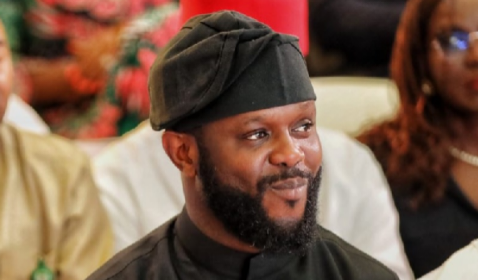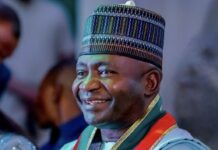By Shu’aibu Usman Leman
Recent happenings involving Seyi Tinubu, son of President Bola Tinubu, have caused a fair bit of unease regarding the damaging influence of nepotism on Nigerian politics.
Seyi’s well-publicised jaunts across several states, during which he handed out snacks and food items during Ramadan, have certainly attracted attention, particularly when you consider the rather ostentatious motorcade he traveled with.
This spectacle has not only raised eyebrows about the appropriateness of such displays of privilege but also points to a worrying trend that poses a serious threat to Nigeria’s democratic integrity.
These allegations have sparked considerable controversy regarding the propriety of his involvement in matters of governance, with critics arguing that such participation risks undermining the fundamental principles of meritocracy and transparency, which are absolutely essential for sound administration.
Many Nigerians have voiced their anxieties concerning the reported involvement of relatives of public office holders in governmental affairs, raising legitimate concerns about potential conflicts of interest and the favouring of family.
They rightly emphasise the need for decision-making processes to prioritise the public interest above personal or familial agendas.
This situation serves as a stark reminder of the enduring need for transparency, accountability, and the upholding of ethical standards in governance.
It highlights the crucial importance of public officials and their family members refraining from any actions that could bring the integrity of governmental processes into question, thereby ensuring that governance remains answerable to the citizenry it serves.
More broadly, this incident draws attention to the wider discourse on nepotism and the importance of establishing clear boundaries between the private interests of political figures and their families and the impartial execution of public duties.
It also prompts reflection on the mechanisms and oversight required to safeguard the impartiality and fairness of governmental institutions, not just in Nigeria but elsewhere, too.
After all, the allure of familial favouritism is a universal challenge to good governance.
However, concerns surrounding nepotism extend well beyond the Tinubu family. Nigeria’s political landscape has long been characterised by a rather troubling reliance on familial connections, where the offspring of influential figures exploit their family ties to wield significant influence in governmental affairs, including decision-making processes, key appointments, and rather lucrative contracts.
This pattern fundamentally undermines the principles of meritocracy and fairness, creating an uneven playing field that disadvantages perfectly qualified individuals who simply lack the right political pedigree.
It fosters a sense of unfairness and can breed resentment amongst the populace, eroding trust in the system as a whole.
Furthermore, the involvement of prominent political figures such as the First Lady, Senator Remi Tinubu, in advocating for her husband’s political agenda further complicates matters.
This intertwining of personal and political interests raises critical questions about governance transparency and accountability.
The boundary between public duty and private ambition becomes increasingly blurred, leading to scepticism about the genuineness of public service and the potential for conflicts of interest that can erode public trust in governmental institutions.
This isn’t just a Nigerian issue; we’ve seen similar dynamics play out in various democracies across the globe, where the lines between family and state become worryingly indistinct.
The implications of nepotism are particularly concerning as Nigeria prepares for the crucial 2027 elections.
With the Independent National Electoral Commission (INEC) yet to officially lift the ban on political campaigning, the activities of the Tinubu family could be interpreted as a sign of premature campaigning, giving them an unfair advantage.
This situation sets a precarious precedent, potentially opening the door for other political families to similarly entrench their influence, possibly inciting controversy and polarising the electorate.
It risks turning the electoral process into a competition of dynasties rather than a contest of ideas and policies.
Beyond the immediate ramifications for political dynamics, the rise of nepotism poses a more profound existential challenge to Nigeria’s democracy.
The concentration of power among a select few families not only stifles democratic participation but also compromises the ability of citizens to hold public officials to account.
Such consolidation threatens to undermine the fundamental elements of a thriving democracy, including freedom of choice, fair representation, and equal opportunity for all citizens to participate in the political sphere without undue barriers. This can lead to a sense of disenfranchisement and a weakening of democratic institutions over time.
To mitigate the risks associated with nepotism, Nigeria must champion policies that prioritise transparency and accountability in governance. Implementing and enforcing robust anti-nepotism laws, with real teeth, could play a crucial role in dismantling entrenched networks of favouritism.
Moreover, fostering a culture of merit-based governance is imperative to restoring public faith in political institutions and ensuring that leadership positions are awarded based on ability and integrity rather than familial connections. This requires a shift in mindset, both within the political class and the wider society.
As Nigeria continues its journey towards a more vibrant democracy, it is vital that citizens and leaders alike advocate for frameworks that promote inclusivity and equal access to political opportunities.
By addressing the root causes of nepotism and taking proactive steps to combat it, Nigeria can work towards building a more equitable, transparent, and trustworthy political system that reflects the values and aspirations of all its people. In so doing, the nation can safeguard its democratic future and ensure that power truly resides with the populace, not just a privileged few.
This is a long game, requiring sustained effort and vigilance from all stakeholders.
Such accusations are particularly troubling given the alleged involvement of state institutions and security officials, raising serious questions about the impartiality of agencies ostensibly tasked with upholding democratic principles and safeguarding citizens.
Has governance in Nigeria descended into a private fiefdom where the first family can exert unfettered influence over civil society organisations, compelling them into submission through threats or mercenary tactics?
If left unchecked, this trend risks exacerbating the existing fractures within Nigeria’s democratic framework and could lead to a breakdown of the rule of law.
The notion that the presidency can serve as a form of private inheritance rather than a public trust is a distinctly perilous one. The boundary between leadership and familial entitlement is a slippery slope – one that, if traversed, could entrench autocratic tendencies and erode the very foundations of democratic norms. Democracy thrives on accountability, transparency, and a respect for civil liberties.
Yet, if the actions of the Tinubu family are not properly addressed and scrutinised, they risk reducing Nigeria’s governance to a form of neo-feudalism where power is concentrated within a single lineage.
This has historical echoes in various parts of the world, and the outcomes are rarely beneficial for the wider population.
Furthermore, the seemingly desperate attempts to divert attention from these grave accusations by drawing spurious links to political adversaries, such as former Vice President Atiku Abubakar, further underscoreprecariousness of the current administration.
Alhaji Atiku Abubakar’s advocacy for national progress through his engagement with various stakeholders ought not to be misrepresented as political collusion.
Such tactics merely serve to muddy the waters further, deflecting from the urgent necessity of an independent inquiry into the allegations raised.
Transparency demands a clear and honest accounting, not political point-scoring.
As concerned citizens of Nigeria, it is vital that the public collectively condemn the actions attributed to the presidential family and assert unequivocally that democratic governance cannot and must not be manipulated for personal gain. Nigerian society must rally in support of advocates for democracy and insist on accountability, ensuring that those who wield power do so in accordance with established laws and societal standards.
The strength of a democracy lies in its ability to hold power to account, regardless of familial ties.
The danger inherent in allowing governance to be treated as a private enterprise cannot be overstated. Should the current trajectory persist, Nigeria risks not only the undermining of democratic principles but also jeopardising the safety and well-being of its most vulnerable citizens.
As Seyi’s reported actions suggest, unchecked power can lead to the silencing of dissent and the oppression of those who dare to challenge the status quo. Failure to rein in such behaviour is not merely a familial responsibility; it is a national imperative with far-reaching consequences for Nigeria’s standing on the global stage and its future stability. The international community watches these developments with keen interest, and the perception of Nigeria’s governance impacts its relationships and its ability to attract investment.
Nigeria cannot afford to turn a blind eye to the deepening entanglement of power and familial ambition. The nation deserves a government that upholds the rule of law, prioritises civil liberties, and operates with transparency – one that understands that true leadership is rooted in the service of the populace, not the self-serving interests of a privileged few.
The demand for accountability resonates clearly, urging both governmental institutions and the citizens they serve to unite in defence of democracy before it is irrevocably compromised.
This situation serves as a clear reminder of the vigilance required to safeguard democratic values against the insidious creep of patrimonialism, a challenge that many nations, in their own ways, continue to grapple with.
Leman is a former National Secretary of the Nigeria Union of Journalists (NUJ)
email: shuaibuusmanleman@yahoo.com










